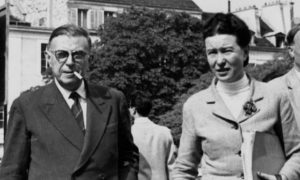Stuart Jeffries in The Guardian:
 On August 1943, the sales team at Gallimard noticed something odd. The publisher’s new 700-page philosophical tome was selling unexpectedly well. Was it because Jean-Paul Sartre’s thoughts on freedom and responsibility in Being and Nothingness resonated with Parisians enduring Nazi occupation? Not quite. It was because the book weighed exactly one kilogram and so was a perfect substitute for copper weights, which had been sold on the black market or melted down for ammunition. Agnès Poirier’s engaging romp through the decade in which Paris rose from wartime shame to assert its claims to be world capital of art, philosophy and turtlenecks teems with such vignettes. When Ernest Hemingway arrived in Paris with fellow allied liberators in August 1944, for instance, he parked his Jeep outside 7 Rue des Grands Augustins – Picasso’s wartime studio. No one was in, so he left his impeccably butch calling card – a bucket of grenades, plus a note reading: “To Picasso from Hemingway”. Poirier never tells us what happened to those grenades.
On August 1943, the sales team at Gallimard noticed something odd. The publisher’s new 700-page philosophical tome was selling unexpectedly well. Was it because Jean-Paul Sartre’s thoughts on freedom and responsibility in Being and Nothingness resonated with Parisians enduring Nazi occupation? Not quite. It was because the book weighed exactly one kilogram and so was a perfect substitute for copper weights, which had been sold on the black market or melted down for ammunition. Agnès Poirier’s engaging romp through the decade in which Paris rose from wartime shame to assert its claims to be world capital of art, philosophy and turtlenecks teems with such vignettes. When Ernest Hemingway arrived in Paris with fellow allied liberators in August 1944, for instance, he parked his Jeep outside 7 Rue des Grands Augustins – Picasso’s wartime studio. No one was in, so he left his impeccably butch calling card – a bucket of grenades, plus a note reading: “To Picasso from Hemingway”. Poirier never tells us what happened to those grenades.
In one of my favourite moments Simone de Beauvoir pauses on the Pont Neuf after a nuit blanche of drinking with Sartre, Arthur Koestler and Albert Camus. Looking sadly into the Seine, she sobs over the tragedy of the human condition. “I do not understand why we do not throw ourselves into the water!” she wails to Sartre who, also crying, replies: “Well, let’s do it!” It would take a heart of stone not to laugh. But what is the human condition? Sartre defined it shortly after the liberation. “We were never freer,” he wrote, “than during the German occupation. Since the Nazi venom was poisoning our very own thinking, our every free thought was a victory. The circumstances, often atrocious, of our fight allowed us to live openly this torn and unbearable situation one calls the Human Condition.” But, Poirier points out, that freedom was dubiously won. De Beauvoir signed a form denying she was Jewish so she could continue teaching in occupied Paris. While she and Sartre were never freer, Parisian Jews were being rounded up by Parisian cops and murdered in Nazi death camps.
More here.
